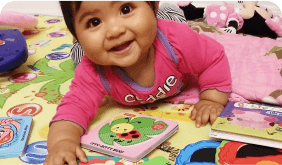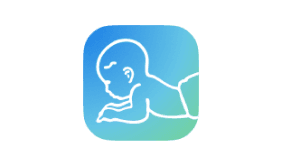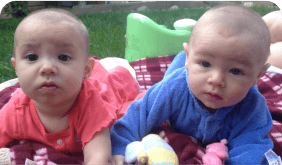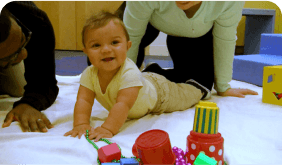Babies typically don’t develop seasonal allergies until late toddlerhood or early childhood, when their exposure to outdoor allergens increases.
Common symptoms of seasonal allergies in children include runny nose, sneezing, and itchy, watery eyes.
If you think Baby may have seasonal allergies, talk to their healthcare provider about allergy testing and strategies for managing their symptoms, like staying indoors on high pollen count days.
April showers bring May flowers…and May flowers can bring allergies! So can June grass pollen, September weeds, and December mold. Whether the buds are in bloom or the leaves are falling, seasonal allergies can strike any time. As the sniffling and sneezing starts, you may wonder, can Baby get allergies too?
What age can babies get seasonal allergies?
While it’s possible for newborns and babies to get seasonal allergies, it’s pretty uncommon to see them develop until late toddlerhood or early childhood. This is because they haven’t spent enough time outdoors to get exposed to seasonal allergens like pollen. Since babies spend most of their early years inside, it’s more likely for them to develop allergies to indoor allergens such as dust and pet dander first.
Seasonal Allergy Symptoms to Look for in Children
Seasonal allergy symptoms can appear similar to those of a common cold in your child. However, they tend to come on suddenly, show up at the same time each year, and stick around as long as the allergen stays in contact. These are typical seasonal allergy symptoms your child may experience:
Runny or stuffy nose
Itchy, watery eyes
Sneezing
Sniffling
Coughing
Sore throat

Common Seasonal Allergens
Allergen type and frequency will depend on the climate you live in, but these are common allergens by season:
Spring: tree and other plant pollens, mold
Summer: grass and other plant pollens
Autumn: weed pollen, mold
Winter: mold
What to Do If You Suspect Baby Has Seasonal Allergies
Talk to Baby’s healthcare provider if you notice signs of seasonal allergies. They can help your child get allergy tests and offer treatments and tips to manage their symptoms. In the meantime, you can reduce exposure to seasonal allergens by:
Keeping your child inside and closing windows when pollen count is high or on dry, windy days
Washing your child’s clothing and having them bathe after spending time outdoors
Limiting your child’s contact with trees, grass, weeds, or flowers
It’s important to note that some children can have more severe reactions to common seasonal allergens, especially if they have a condition that can be triggered by allergies. Seek immediate care if your child is having difficulty breathing or experiencing unusual symptoms.





